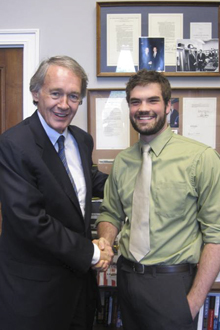Segal Fellows learn to do good while doing well
Fellows to speak Monday of hands-on experience, fulfilling work and building networks

Matthew Schmidt '11 (above right) with Congressman Markey. Front photo: Jerry Saunders '11 (left) talking with City Year colleagues.
It’s not too early to think about summer plans. For students interested in finding a way to make their mark by doing good, the three-year-old Eli J. Segal Leadership Program may be just the ticket.
Segal fellows are given an internship and a stipend to spend the summer learning at the elbow of an experienced, successful coach, called a “founder,” who has done well while doing good. Fellows are assigned to government and non-profit agencies in Boston, New York City and Washington, D.C.
The program is holding an informational session on Monday (Nov. 15) at 5:15 p.m. in the Hassenfeld building, Lurias Room. Application deadline is 3 p.m. December 22. Fellowships are open to undergraduates who will be juniors and seniors next fall, and those who will be second year students in the Heller School’s Master of Public Policy program. Six to nine students are accepted annually, with undergraduates receiving a living stipend of $3,500 and graduate students receiving stipends of $5,000.
The fellowship is named for Eli J. Segal ’64, who died young. Segal was, according to his long-time friend, President Bill Clinton, “The father of AmeriCorps,” a national service organization that has sent over a half million volunteers to help out in communities across the United States. Segal was also a founder of the Welfare-to-Work Partnership which is credited with transforming millions of lives. The partnership works with businesses, encouraging them to promote self-sufficiency among welfare recipients by providing jobs. When Segal died, his family and friends -- many of whom headed successful programs themselves -- wanted his work to carry on. They formed a group of 400 founders to finance an endowment that supports the Segal Fellowships, which, according to the web site, "encourage emerging leaders to engage in a lifetime of citizen service." The Segal Foundation's 2007 inaugural address was delivered by President Clinton. These 400 founders not only provided the financing to endow the program, but continue to be tapped to act as mentors to Segal Fellows.
Matthew Schmidt ’11 had been very active in campus environmental causes so he was keen to find an internship that tapped into that interest. His Segal Fellowship this past summer placed him in the Washington D.C. office of Congressman Edward Markey, who was Chair of the Select Committee on Energy Independence. Then the Gulf oil disaster struck.
“It was a big sink or swim,” says Schmidt. “Everyone was in overdrive mode because of the spill.”
Schmidt, an economics and politics major, found his academic training was put to good use as he worked under tight deadlines. “I did some basic research…on the federal history of oil and gas leasing,” he says. “We put together a big timeline and briefed Markey. I got to attend congressional hearings and sit right next to big oil CEOs.”
All summer Schmidt met regularly with a Segal “founder”, a deputy secretary in the Department of Housing and Urban Development. “It was great to have someone who was a Washington insider meet me for lunch,” he says. “All the fellows get coaches, all related to government and public policy. Networking is a huge part of it. It was a great opportunity. I got a good taste of how policy works.”
Pre-med biology major Jerry Saunders, ’11, agrees that making connections is key. “The real strength is the network itself,” says Saunders, who was a Segal Fellow two summers ago. “It’s bringing the founders together with a new generation of students who want to do good.”
Saunders wanted to learn the nuts and bolts of an organization. He spent his summer working both in the field and behind the scenes at “City Year” in Boston, a social service agency that sends out groups of high school and college age volunteers to perform community service. “I got working in the Research and Strategic Operations Department. We tried to find funding for City Year,” says Saunders. “Right now it’s privately funded and we tried to find other sources of funding.”
Saunders says he learned how to build up contacts. “We’d call the local education director or others who knew about state funding and soon we had a detailed map of each school district and knew how much we could possibly get,” says Saunders. “By the end of summer we had a pretty good network.”
This, Saunders says, is good training for his plans after medical school, when he hopes to have a broader impact. “I’m interested in health care administration at the local level,” he says. “It’s a balancing act between the humanitarian level and the business level. I’ve been able to learn things [through the Segal Fellowship] that I will have to consider as I enter a career of health care administration.”
Both Saunders and Schmidt highly recommend the Segal Fellowships, noting that once a fellow, always a fellow. After their summer experiences are over, Segal Fellows formally remain part of the Segal Network, sharing information and supporting one another throughout their careers.
Categories: Humanities and Social Sciences, Student Life





